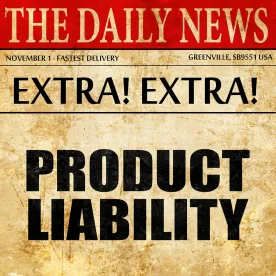Although the attached opinion has not been published and is not binding on a New Jersey Court, product liability practitioners and entrepreneurs should take note of New Jersey Manufacturers Insurance Group A/S/O Angela Sigismondi v. Amazon.com Inc., (D.N.J. 2022). In that opinion, the federal district court, interpreting New Jersey law, held, under the circumstances, that Amazon qualified as a product seller under New Jersey’s Product Liability Act (NJPLA) definition of “product seller”, which includes “any person who, in the course of business conducted for that purpose: *** otherwise is involved in placing a product in the line of commerce.” It further held that Amazon could not escape strict liability on summary judgment under the “innocent seller” section of the NJPLA by identifying the manufacturer of the allegedly defective product because Amazon was a N.J.S.A. 2A: 58C-9(d)(2) seller that “knew or should have known of the defect.”
As discussed by the Court, the NJPLA provides that:
A manufacturer or seller of a product shall be liable in a product liability action only if the claimant proves by a preponderance of the evidence that the product causing the harm was not reasonably fit, suitable[,] or safe for its intended purpose because it: a. deviated from the design specifications, formulae, or performance standards of the manufacturer or from otherwise identical units manufactured to the same manufacturing specifications or formulae, or b. failed to contain adequate warnings or instructions, or c. was designed in a defective manner.
N.J.S.A. § 2A:58C−2. In N.J.S.A. § 2A:58C-8, a related section under the same products liability chapter, the terms “manufacturer” and “product seller” are defined. There, a “product seller” is defined as follows:
Any person who, in the course of a business conducted for that purpose: sells; distributes; leases; installs; prepares or assembles a manufacturer’s product according to the manufacturer’s plan, intention, design, specifications or formulations; blends; packages; labels; markets; repairs; maintains or otherwise is involved in placing a product in the line of commerce.
>
The term “product seller” does not include:
-
A seller of real property; or
-
A provider of professional services in any case in which the sale or use of a product is incidental to the transaction and the essence of the transaction is the furnishing of judgment, skill, or services; or
-
Any person who acts in only a financial capacity with respect to the sale of a product.
N.J.S.A. § 2A:58C-8 (emphasis added).
Opinion at pp. 8-9. The District Court found here that, because “Amazon was in the business of selling hoverboards and was involved in putting them in the line of commerce, *** Amazon was a ‘product seller’ under the NJPLA***.” Opinion at p. 16.
The NJPLA provides a potential defense to an innocent product seller who formally identifies the actual manufacturer, unless:
(1) The identity of the manufacturer given to the plaintiff by the product seller was incorrect.
(2) The manufacturer has no known agents, facility, or other presence within the United States.
(3) The manufacturer has no attachable assets or has been adjudicated bankrupt and a judgment is not otherwise recoverable from the assets of the bankruptcy estate.
(4) The product seller has exercised some significant control over the design, manufacture, packaging or labeling of the product relative to the alleged defect in the product which caused the injury, death, or damage.
(5) The product seller knew or should have known of the defect in the product which caused the injury, death or damage or the plaintiff can affirmatively demonstrate that the product seller was in possession of facts from which a reasonable person would conclude that the product seller had or should have had knowledge of the alleged defect in the product which caused the injury, death, or damage; or
(6) The product seller created the defect in the product which caused the injury, death, or damage.
See generally N.J.S.A. 2A:58C-9.
Here, because the Court found that Amazon fit the criteria of N.J.S.A. 2A:58C-9(d)(2), it could not grant Amazon’s motion for summary judgment. Presumably, the Court did not review the other NJPLA section nine “innocent seller” exceptions because it found Amazon to be a N.J.S.A. 2A:58C-9(d)(2) seller. Although the identity of a manufacturer was not discussed by the Court, the third-party seller was a “Chinese company, located in Shenzhen. Guangdong”. Opinion at p.2. This case leaves an important potential lesson for distributors, sellers, retailers, and anyone “involved in placing a product in the line of commerce”. Among other things, you must take extra, diligent measures to be sure that you can recover on an indemnity claim against the manufacturer or the up-chain seller(s) of the product. An indemnity is only as good as the ability to collect on it. If you cannot enforce and collect on an indemnity against assets in the United States, you should consider alternative protections and strategies to avoid taking on the de facto role as another’s insurance carrier. You simply want to avoid being the deep pocketed, easy target that lacks any practical recourse.




 />i
/>i

